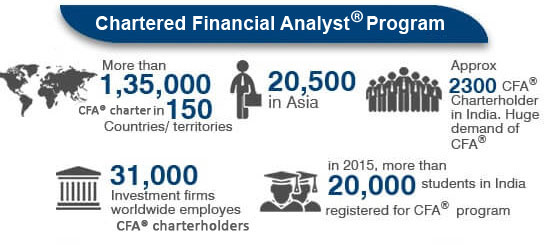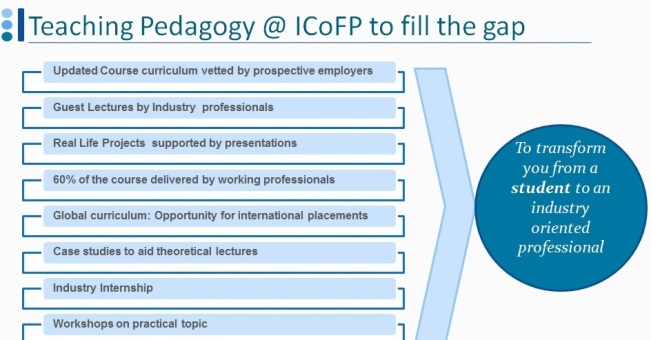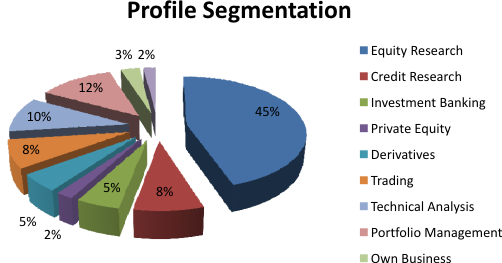1. Professional Ethics & Corporate Governance:
Just like other professional skills, professional ethics are a prerequisite for finance professionals. This topic presents the framework of ethical conduct given by CFA Institute of America in addition with principles of corporate governance.
2. Security Analysis-1: This unit is divided in four parts:
a. Equity Analysis: One of the most rewarding & challenging tasks in world of finance is equity research. This topic sets the foundation for deeper study as it starts with intro of equity market terminologies and goes into industry & company analysis techniques. Finally it talks about fundamental and relative valuation techniques, which we shall study in great details later.
b. Debt Analysis: This topic covers analysis of fixed income instruments, one of the largest and fastest growing segments of global financial markets. It covers characteristics & risks involved in fixed income instruments, structure of global bond markets and analysis of fixed income yields & spreads.
c. Alternate Investment Analysis: Universe of alternate investments is huge and full of innovation. Topic introduces types, features, risks & return of various alternate investments such as property, commodities, private equities, hedge funds, ETFs etc.
d. Derivative Strategies: It covers various types of derivative instruments such as forwards, futures, options, swaps etc and introduction to their application in risk management.
3. Financial Reporting & Analysis-1:
It starts with basic principles of financial reporting and goes on to discuss all types of financial statements of a company. Later part covers prominent techniques to decode & analyze relevant information to facilitate decision making. Finally a topic of great practical importance is covered, convergence of accounting standards to IFRS.
4. Corporate Finance:
The topic covers the principles that corporations use to make their investing and financing decisions. Initial part covers techniques of capital budgeting, measuring cost of capital & leverage. Later part covers management of working capital and dividend policies of a company.
5. Portfolio Management & Quantitative Techniques-1: This part is divided into two parts:
a. Portfolio Management: Portfolio Management is one of the most researched topics in finance. This topic covers introduction to process of portfolio management, understanding client objectives & constraints & quantifying them. Finally you study the theories of portfolio management and critically analyze them in the end.
b. Quantitative Techniques: Topic presents the fundamentals of some of those quantitative techniques that are essential in almost any type of financial analysis. Topic includes advanced discussion of time value of money, discounted cash flows, statistical concepts & probability theory, all from the finance perspective.
6. Advanced Economics:
Topic covers in depth study of micro & macroeconomic school of thoughts. With perspective to finance, topic covers demand-supply equilibrium, firm output decisions & costs under micro economics. The macroeconomics part explains different market structures under which firms operate and goes on to explain how at macro level GDP is determined due to aggregate demand and supply interaction, how business cycles originate and finally impact of monetary & fiscal policies on economy.
1. Security Analysis-2:
This topic is advanced extension of security analysis studied in previous semester, again is divided in four parts:
a. Equity Analysis: This study session presents additional valuation methods for estimating a company's intrinsic value, fundamental as well as relative, different approaches to research such as top-down & bottom, approach to industry analysis, valuation of emerging markets, valuation of private companies.
b. Debt Analysis: For the first time you study here about valuation of complex fixed income instruments, credit analysis, liquidity analysis, analysis of term structure of interest rates.
c. Alternate Investment Analysis: After having studied briefly about types of alternate investments, you study how to value and analyze alternate investments and manage them in your portfolio. Special focus is on Real Estate, Private Equity, Commodities & Hedge Funds.
d. Derivative Strategies: After having understood types & features of derivatives in sem 1, you will learn about pricing, valuation and application of derivatives in risk management.
2. Economics for Valuation:
This topic focuses on linking thus far learnt economics concepts with valuation of securities by explaining the impact of macroeconomic environment on firm's profitability. Focus is on Growth theories, exchange rate theories & Concepts and measures of economic growth.
3. Financial Reporting & Analysis-2:
In this advanced version some key issues that affect company valuations are covered in details. It covers analysis of M&A Accounting,Post-Employment and Share-Based compensation, Multinational Operations and how different accounting policies may affect analytical interpretation and how to troubleshoot it. In the end you study advanced techniques of ratio analysis & determining quality of earnings.
4. Corporate Finance & Ethical Standards:
This reading is divided in 2 parts:
a. Corporate Finance: Topic covers advanced discussion on capital budgeting principles, dividend policy, capital structure policy, corporate governance and M&A strategies.
b. Ethical Standards: Except some new ethical principles, topic repeats most part of ethical standards read in sem 1, it shows great amount of importance given to this topic.
5. Portfolio Management & Quantitative Techniques-2:
This reading has 2 parts:
a. Portfolio Management: Topic introduces a popular extension to Markowitz portfolio theory studied in sem 1, the Capital Asset Pricing Model and explains how to quantify & diversify portfolio risk using efficient portfolios. Later you study more theories such as theory of active portfolio management, international diversification and managing taxation to maximize post tax gains and finally constructing investment policy statement.
b. Quantitative Techniques: Topic focuses on popular quantitative tool in research, the regression analysis. It covers single, multivariable and time series regression models along with techniques to assess credibility of such tests, called ANOVA.
6. Research Project 1:
Knowledge once practiced becomes wisdom. So this part is about practical application of most concepts discussed so far. The full-fledged project is based on real time issues and is made under expert guidance with access to necessary software and infrastructure.
1. Financial Management -1:
Finance professionals are responsible for most optimum allocation of corporate resources; this topic covers various techniques to meet this goal. It complements corporate finance topic studied so far and covers introduction to financial management, cash flow estimation, financial systems in India, sources of finance etc.
2. Financial Modeling Basic and Advanced:
Modeling techniques for accurate financial forecasting are heavily used in most areas of finance.Thus here we study basic & advanced financial excel to help create models for Valuation, Financial Statement Analysis, M&A, LBO and Risk Management.
3. Wealth Management:
Wealth Management is an integral part of overall process of portfolio management and is important for companies as well as individuals. Here we learn to study patterns of behavioral finance, issues important in private wealth management and institutional wealth management.
4. Application of Economics in Portfolio Management:
Here we study the branch of Economics that help in formulate the Capital Market Expectation and Valuation of Assets.
5. Portfolio Management Process and Execution:
The topic streamlines and compliments readings done so far by formally introducing detailed process of portfolio management and execution related aspects such as Asset Allocation, ALM approach, Trading Decisions, Algorithm Trading, Monitoring, Rebalancing and Performance Evaluation.
6. Research Project-2:
Knowledge once practiced becomes wisdom. So this part is about practical application of most concepts discussed so far. The full-fledged project is based on real time issues and is made under expert guidance with access to necessary software and infrastructure.
1. Financial Management-2 & Project Work:
The topic discusses advanced level financial decisions taken by top management such as Debt and Hybrid Financing, Working Capital Management, Corporate Valuation, Managing Sick Units, Restructuring and Value Creation and some special topics followed by a project on the topic.
2. Fixed Income Portfolio management:
Topic explains how fixed income (FI) portfolio is managed while deploying knowledge of previous readings. Approaches of FI portfolio Management such as objective only, ALM, Immunization and multiple liability management are discussed along with Relative-Value Methodologies for Global Credit Bond Portfolio and Hedging Mortgage Securities to Capture Relative Value.
3. Equity Portfolio Management & Project Work:
Equity securities represent a significant portion of many investment portfolios; equity management is often a critical component of overall investment success. This session focuses on the role of equities in an investment portfolio, the three major approaches used to manage equity portfolios, and the evaluation of equity managers.
4. Financial Risk Management & Project Work:
To match the increasingly complex nature of investment management, topic focuses on sophisticated risk management techniques to provide analysts with the necessary tools to properly measure the varying facets of risk including market, liquidity, credit ¤cy risk. Post measuring & modeling risk topic moves to risk management using forwards, futures, options, swaps and quantitative techniques followed by a project on the topic.
5. Alternate Investment Analysis & Project Work:
Portfolio managers who take advantage of the opportunities presented by alternative investments may have a substantial advantage over those who do not. The topic initially presents an overview of the investment classes generally considered as alternative investments and then examines the role of swaps, forwards, and futures in managing certain alternative investments followed by a project on the topic.
6. Research Project-3:
The full-fledged project will invite all skills learnt during the program into practice by selecting an area of practical importance that research analysts with multiple years of experience are generally working on. Such project again is made under expert guidance with access to necessary software and infrastructure.


